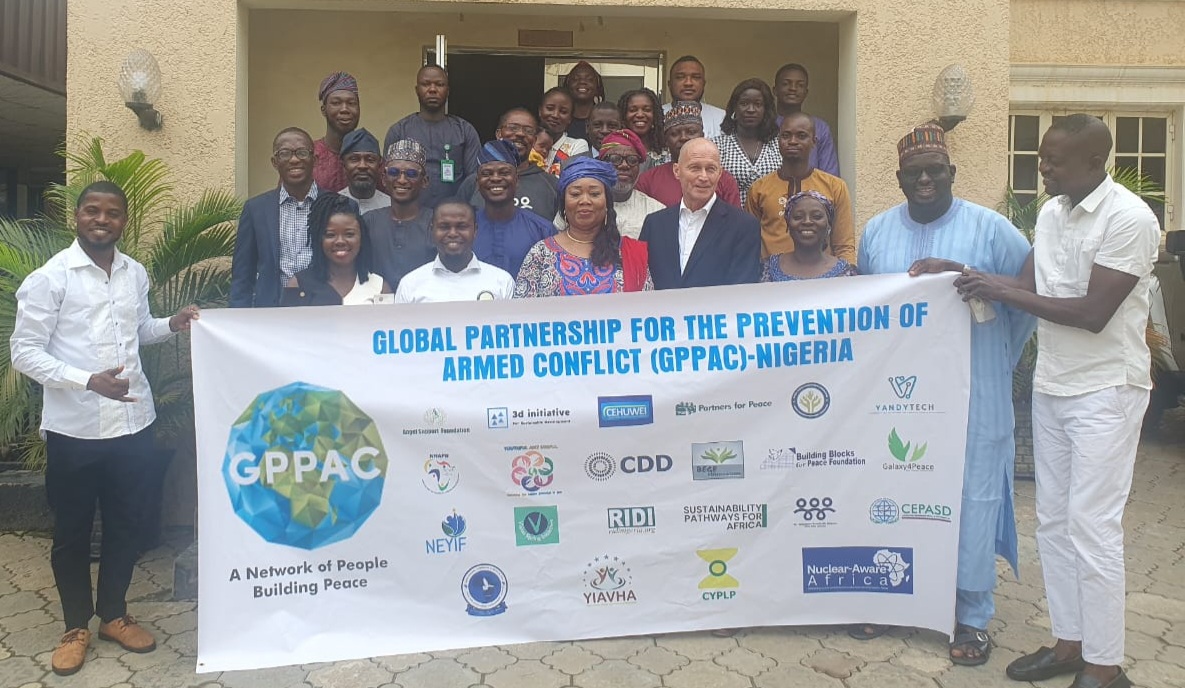Metro
CSOs float network on conflict prevention, peace-building in Nigeria

Civil Society Organisations (CSOs) have formed a network to foster collaborative efforts toward conflict prevention and peacebuilding across communities.
The network — Global Partnership for the Prevention of Armed Conflicts (GPPAC), is working through 15 regional networks
across the world to prevent violent conflicts and build peaceful societies.
Mr Rafiu-Adeniran Lawal, the Regional Representative of GPPAC, West Africa, made this known at the GPPAC Nigeria inaugural meeting on Wednesday in Abuja that the meeting is focusing on “The Role of Civil Societies in Fostering Peace, Security and Social Cohesion.”
Lawal said that the event’s theme was chosen to encourage synergy among members toward finding solutions to the
plethora of peace and security threats across the country.
According to him, GPPAC seeks a world where violence and armed conflicts are prevented and resolved by peaceful means based on justice, gender equity, sustainable development, and human security for all.
“As the Regional Representative of GPPAC West Africa, I am committed to driving the decentralisation of GPPAC within the region, mobilising civil society organisations for peacebuilding and ensuring that members take ownership of the network.
“We will establish and set up GPPAC national networks in all West African countries.
“We have had considerable successes in Niger Republic, Ghana, and Senegal, where National Focal Points have been appointed.
“The purpose of the national networks is to strengthen the agency and capacity of actors to foster collaborative efforts toward conflict prevention and peacebuilding across communities in West Africa.”
Lawal listed the three main priority areas that would guide the GPPAC West Africa network agenda in accordance with the strategic framework to include locally led peacebuilding, women and youth peace and security.
He said conflict-sensitive approach to climate-related risks and other emerging threats would also be given adequate attention.
He added that GPPAC’s main functions by the International Steering Group are: promoting acceptance of conflict prevention, support for regional efforts to raise awareness regarding the effectiveness of conflict prevention and undertake parallel efforts at the global level.
He said others include mobilising CSOs’ early response action to prevent conflicts, supporting CSOs in developing capacity to contribute to early warning systems, and intervening effectively in impending crises.
He said that GPPAC would mobilise coordinated CSOs responses based on early warning of impending conflict escalation; and pressure governments, regional organisations, and the UN system to respond to early warning information in response to regional requests.
Prof. Charles Ukeje, Professor of International Relations at Obafemi Awolowo University, Ile-Ife, said CSOs add value to government work by providing timely information and insights into conflicts.
Ukeje said CSOs also serve as early warning givers to government and other stakeholders, and act as intermediaries between states and the society.
He, therefore, urged government to see CSOs as partners in progress, adding that “when government sees CSOs as active collaborators and stakeholders in the maintenance of peace and security, the approach would be different.”
Ukeje also urged CSOs not to portray themselves as oppositional elements but collaborate with government to build bridges.
Dr Nasir Sani-Gwarzo, the Permanent Secretary, Federal Ministry of Humanitarian Affairs, Disaster Management and Social Development,
commended GPPAC for the initiative.
Represented by Mrs Agnes Aneke, the Director, Special Duties, Sani-Gwarzo said armed conflicts destroy societies, causing hunger, health challenges, displacement, destitution and underdevelopment.
He said “stability and unity are essential for any nation embarking on development process and one of the keys to achieving this is the development of strategies for the prevention of violence in all its forms.
“The case of nations such as Liberia, Sierra-Leone, Rwanda, and Sudan to mention a few, calls for reflection on the causative factors of violence that led to the armed conflicts, devastating impacts, and post-war consequences on these nations.
“There is need to remind ourselves of the essence of peace and national cohesion as the only ways to guarantee economic growth and stability.
“We must orient our young ones on the core values of tolerance and respect for one another.”
Metro
Ex-Sports Minister laments after hospital neglected him for hours over N80000 deposit

A former Minister of Youth and Sports, Solomon Dalung, has recounted how a hospital in Plateau State did not attend to him because of the non-payment of the admission deposit.
Dalung said he fell ill on Wednesday, May 8, and went to the unnamed hospital for treatment but that the hospital refused to give him treatment because he had yet to make an admission deposit despite holding his medical records. The former minister said he regained partial consciousness later and transferred the deposit before he was attended to.
“I took ill on Wednesday, arrived at the hospital & shortly became unconscious after doctor’s interviews. Was ferried into emergency ward but abandoned for over 4 hrs due to non payments of admission deposits. Regained partial consciousness later did the transfer of deposit.
After that, I fell into unconsciousness again for about 7 hours. To God be the glory, I have been discharged after 3 days & recovering. Were it not for partial consciousness to pay the deposits, I would have been Mr. late. Many Nigerians have gone this way. Where is our humanity?
I was then admitted into the ward and given medical attention. This is the hospital that has my medical records. The last medical checkup I did about 2 months ago was there, but suddenly, I became a stranger because of non payments of deposits even with the so-called name. Hmmmm”
Metro
Osun Poly Student, Olanrewaju Olatona killed by hit-and-run one-way driver

A Student Of Osun State Polytechnic, Iree, Osun State, has died after being hit by a trailer driver on Monday, April 15.
The Accident was said to have occurred when the driver, who was reportedly driving against traffic, collided with the motorcycle conveying a student named Olanrewaju Olatona and another passenger along the Ikirun-Osogbo road area of the state.
Due to the severe impact, Olanrewaju Olatona, a National Diploma 2 student, suffered fatal injuries. He died at the scene.
Olatona, who was the Financial Secretary of the Department of Mass Communication, was preparing for the one-year Industrial Training programme.
The driver fled the scene after the accident and has not been apprehended.
Subsequently, Osun State Polytechnic students organised a procession in front of the school gate and blocked the expressway for several hours.
-

 Business5 days ago
Business5 days agoNigeria needs over $2bn to revive Ajaokuta Steel Plant, says Minister
-

 Headline5 days ago
Headline5 days agoSuspend cybersecurity levy– Reps to CBN
-

 Headline3 days ago
Headline3 days agoPrince Harry visits sick Nigerian soldiers in Kaduna
-

 Entertainment3 days ago
Entertainment3 days agoAMVCA Cultural Day: BBNaija’s Neo, Venita win Best Dressed Male, Female
-

 News5 days ago
News5 days agoShan George’s money returned to Zenith Bank account
-

 Metro3 days ago
Metro3 days agoEx-Sports Minister laments after hospital neglected him for hours over N80000 deposit
-

 Headline5 days ago
Headline5 days agoTinubu resumes work after foreign trip



